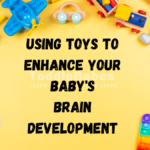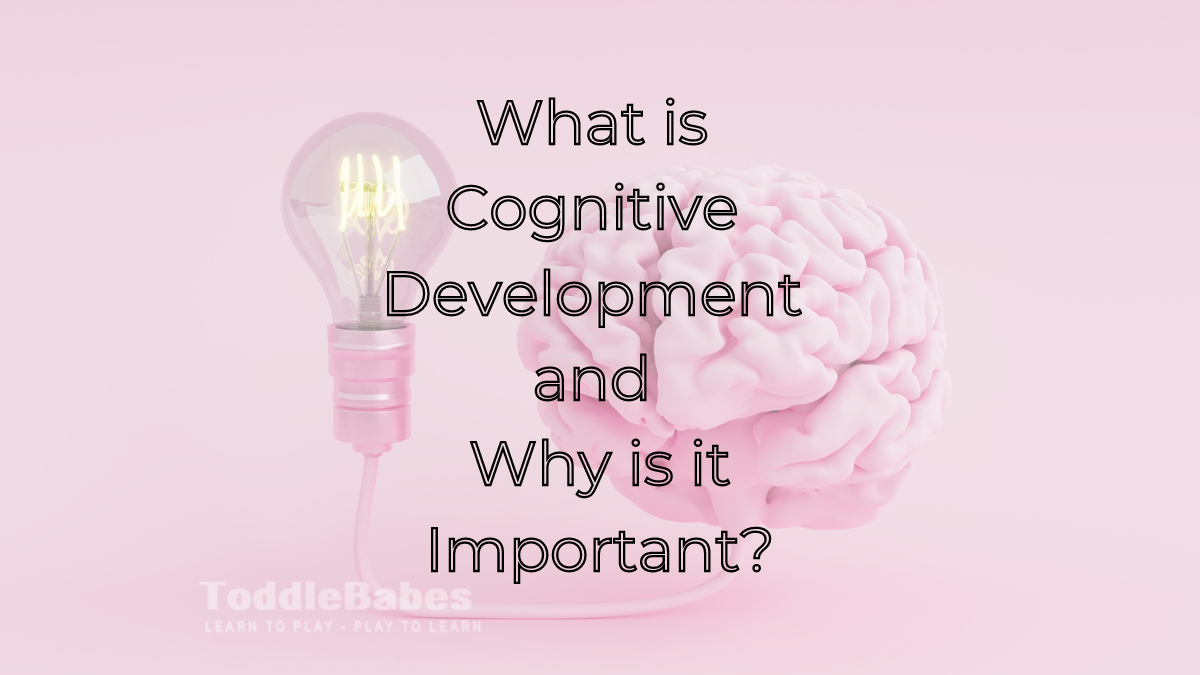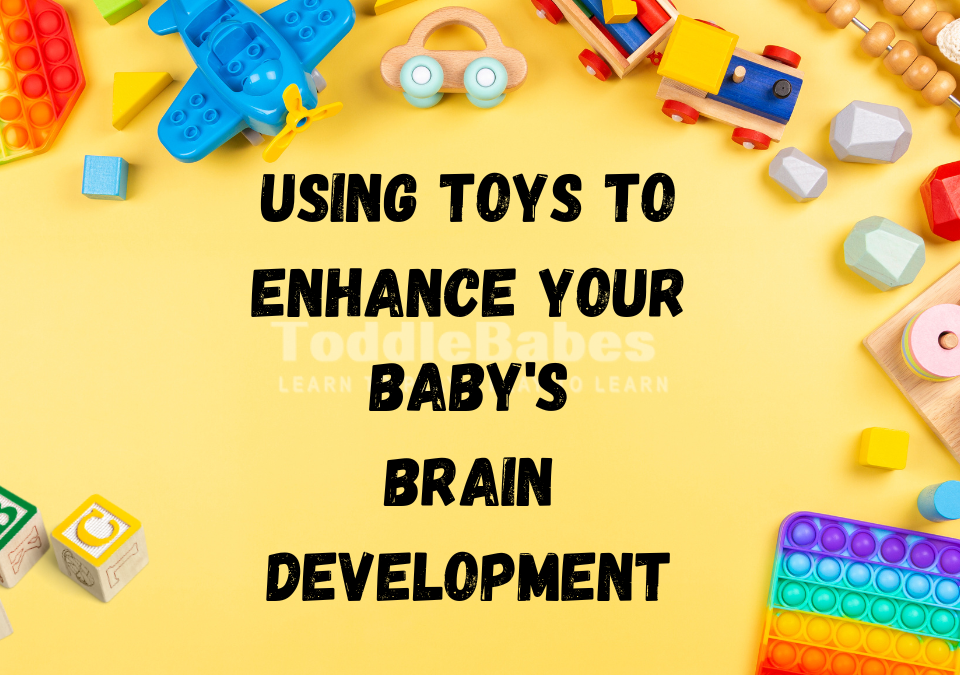
7 Ways Using Toys Enhances Your Baby’s Brain Development

Cognitive development in preschool encompasses a broad range of cognitive processes that gradually evolve and shape a child’s understanding and interaction with the world. It involves the growth and maturation of various cognitive abilities, including thinking, problem-solving, memory, language, and reasoning skills.
Table of Contents
What is Cognitive Development and why is it an important part of the holistic development of your child?
During the preschool years, children’s cognitive development undergoes significant changes as they actively explore, process information, and make sense of their surroundings. They develop the foundational building blocks that will support their future learning and intellectual development.
Thinking skills play a vital role in cognitive development. Preschoolers engage in increasingly complex thinking processes, such as categorizing objects, making comparisons, and forming mental representations. They begin to understand cause-and-effect relationships and develop the ability to predict and anticipate outcomes. Their thinking becomes more abstract, enabling them to grasp concepts beyond the immediate concrete world.
Problem-solving is another key aspect of cognitive development in preschool. Children encounter a variety of challenges and puzzles that require them to apply their thinking skills and find solutions. They learn to analyze problems, break them down into manageable parts, and devise strategies to overcome obstacles. Problem-solving activities encourage critical thinking, creativity, and the ability to think flexibly.
Memory development is also crucial during the preschool years. Children enhance their memory capacity and begin to use memory strategies, such as rehearsal and organization, to retain and recall information. They remember and follow multi-step instructions, recall events from the past, and develop a sense of time and sequencing.
Cognitive development encompasses Language and communication skills that undergo significant growth during the preschool years. Children expand their vocabulary, acquire more sophisticated grammatical structures, and improve their ability to express thoughts and ideas. Language development facilitates cognitive growth by enabling children to think and reason with greater complexity, as well as facilitating their social interactions and learning from others.
Reasoning abilities become more advanced as children progress through preschool. They engage in logical reasoning, making connections between ideas and drawing conclusions based on evidence. They develop the ability to understand and follow rules, apply logical thinking to solve problems and engage in hypothetical thinking.
Overall, cognitive development in preschool lays the foundation for higher-level cognitive abilities that will continue to evolve throughout a child’s educational journey. It promotes the growth of critical thinking, problem-solving, memory, language, and reasoning skills, equipping children with the cognitive tools necessary for understanding, navigating, and actively participating in the world around them.
Puzzle and construction toys are great for cognitive development!
Here are key aspects of cognitive development in preschool:
-
Language Development:
Language development during the preschool years is a remarkable process that sees children make significant strides in their ability to communicate effectively. This critical period of language acquisition is marked by the expansion of vocabulary, the refinement of grammar, and the development of advanced language skills that enable children to express themselves more fluently and comprehensively.
Preschoolers exhibit rapid growth in their vocabulary as they encounter and absorb new words from various sources, such as books, conversations, and their environment. They eagerly acquire words to describe objects, actions, emotions, and concepts. With an ever-expanding vocabulary, they can articulate their needs, interests, and experiences more precisely, enabling more effective communication with others.
Alongside vocabulary growth, preschoolers refine their grammar skills. They become more proficient in understanding and using grammatical structures, including sentence formation, verb tenses, plurals, pronouns, and prepositions. They begin to grasp the rules and patterns of language, allowing them to construct more coherent and grammatically accurate sentences.
Preschoolers develop more advanced language skills, such as storytelling and narrative abilities. They begin to understand the structure of stories, including the concept of a beginning, middle, and end. They engage in imaginative play, creating narratives and dialogues with peers, which enhances their storytelling capabilities. This creative expression strengthens their language skills and fosters their ability to communicate their thoughts and ideas in a coherent and engaging manner.
Preschoolers also gain proficiency in expressing their thoughts and ideas verbally. They develop the skills necessary to articulate their needs, share their experiences, and engage in conversations with others. They learn to express their emotions, describe their observations, and ask questions to satisfy their curiosity about the world. Through increased verbal expression, they become more active participants in social interactions and collaborative play, fostering their social and cognitive development.
For some great toddler-approved books click here!
Language development in preschool is not limited to spoken communication; it also encompasses the development of early literacy skills. Preschoolers show an increasing interest in letters, sounds, and printed words. They begin to recognize and name letters, experiment with early writing, and demonstrate emergent reading skills. Exposure to books, rhymes, and literacy-rich environments further enhances their language development and paves the way for future literacy success.
By actively engaging in language-rich experiences, such as conversations, storytelling, reading, and exposure to a variety of language forms, preschoolers foster their language development. Encouraging and supporting their language growth during this crucial stage sets a strong foundation for their future academic success and lifelong communication skills.
Language development is an important aspect of cognitive development and during the preschool years encompasses vocabulary expansion, grammar refinement, and the development of advanced language skills. Preschoolers gain the ability to express themselves verbally, engage in storytelling, and communicate their thoughts and ideas more effectively. Nurturing language development during this time is crucial for fostering effective communication, cognitive growth, and future literacy success.
-
Executive Functioning:
Executive functioning skills play a crucial role in preschoolers’ cognitive development, allowing them to navigate the demands of daily life and engage in tasks that require attention, self-control, working memory, and flexible thinking. During this stage, preschoolers gradually develop and refine these essential skills, which form the foundation for their future academic success and overall functioning.
Attention is a key aspect of executive functioning that preschoolers begin to master. They become better at focusing their attention on specific tasks, filtering out distractions, and sustaining concentration for longer periods. As their attention span increases, they can engage in activities that require sustained mental effort, such as listening to stories, participating in group discussions, and completing age-appropriate tasks.
Working memory, another crucial executive functioning skill, involves holding and manipulating information in mind for short periods. Preschoolers develop the ability to remember and use information to solve problems, follow multi-step instructions, and engage in tasks that require mental organization. They can retain and process information simultaneously, allowing them to adapt their thinking and behaviour to changing circumstances.
Self-control, or the ability to regulate one’s emotions, impulses, and behaviours, also blossoms during the preschool years. Children learn to delay gratification, manage frustration, and follow rules and instructions. They become more adept at controlling their impulses, sharing with others, taking turns, and resolving conflicts. Self-control allows them to engage in cooperative play, develop social skills, and navigate social interactions more effectively.
Preschoolers begin to exhibit improved skills in planning, organization, and problem-solving. They learn to set goals, break down tasks into manageable steps, and create simple plans to achieve desired outcomes. They develop the ability to organize their materials, prioritize tasks, and initiate and complete activities independently. Problem-solving skills emerge as they encounter challenges, analyze situations, and employ strategies to overcome obstacles or find alternative solutions.
Flexible thinking, a component of executive functioning, also begins to develop during the preschool years. Children become more adaptable and open to new ideas, allowing them to shift their perspectives, consider multiple viewpoints, and embrace different approaches to problem-solving. They display greater cognitive flexibility, enabling them to adjust their thinking in response to new information or changing circumstances.
Supporting and nurturing executive functioning skills in preschoolers involves providing opportunities for structured activities, establishing routines, offering clear instructions, and encouraging independence. Engaging in games, puzzles, and activities that require planning, organization, and problem-solving can further enhance these skills. Moreover, providing a supportive and structured environment helps preschoolers develop their attention, working memory, self-control, and flexible thinking.
In conclusion, executive functioning skills play a vital role in a preschooler’s cognitive development. As they grow, preschoolers become more proficient in focusing attention, using working memory, exercising self-control, and engaging in tasks that require planning, organization, and problem-solving. Strengthening these skills during the preschool years sets the stage for future academic success, self-regulation, and adaptive functioning in various areas of life.
-
Symbolic Thinking:
Symbolic thinking is a remarkable cognitive milestone that emerges during the preschool years. It refers to the ability of preschoolers to understand and use symbols, recognizing that objects, actions, and words can represent something beyond their immediate physical attributes. This developmental leap opens up a world of imagination, creativity, and abstract thinking for young children.
Preschoolers engage in imaginative play, where they use objects as props and assign them different roles or meanings. A simple block can become a phone, a car, or a piece of food in their pretend play scenarios. This imaginative play allows children to experiment with different roles, situations, and narratives, fostering their creativity and social skills.
Through symbolic thinking, preschoolers begin to grasp the concept of representation. They understand that pictures in books, drawings, and symbols can represent real objects or ideas. They can recognize and interpret familiar symbols, such as road signs or logos, and understand their meaning in specific contexts.
Language development intertwines with symbolic thinking, as preschoolers acquire the ability to understand and use words as symbols. They comprehend that words can stand for objects, actions, and concepts. They engage in symbolic play, where they use words to create imaginary scenarios and express their thoughts and feelings.
Symbolic thinking serves as a precursor to more advanced cognitive skills, such as reading and writing. As children develop symbolic understanding, they begin to recognize that written words represent spoken language. They show an interest in letters and start to associate specific sounds with corresponding letters, setting the foundation for phonemic awareness.
Symbolic thinking supports the development of abstract and logical reasoning. Preschoolers can understand and solve simple symbolic puzzles or patterns, recognise relationships and make connections between different symbols or objects. They engage in early mathematics, using symbols to represent quantities and exploring basic mathematical concepts.
Encouraging symbolic thinking in preschoolers involves providing them with opportunities for imaginative play, storytelling, and exposure to symbols and written language. Reading books, engaging in pretend play, and providing materials for drawing and writing can further enhance their symbolic thinking skills. Adults can actively participate in their play, extending their imagination and introducing new ideas and concepts.
In conclusion, symbolic thinking is a significant cognitive development milestone in preschoolers. It enables them to understand and use symbols, recognizing that objects, actions, and words can represent something beyond their literal meaning. Symbolic thinking supports imaginative play, and language development, and lays the foundation for more advanced cognitive abilities, including reading, writing, and abstract reasoning. Nurturing and supporting symbolic thinking in preschoolers fosters their creativity, and cognitive flexibility, and paves the way for future academic and intellectual growth.
-
Problem-Solving and Reasoning:
Problem-solving and reasoning are fundamental cognitive skills that preschoolers actively develop during their early years of education. Through a variety of activities and experiences, they learn to analyze situations, make connections, and devise solutions, fostering their problem-solving and critical-thinking abilities.
Preschoolers engage in problem-solving activities that stimulate their cognitive processes and encourage them to think critically. Puzzles, matching games, and open-ended questions provide opportunities for them to explore, analyze, and find solutions. These activities require them to observe, compare, categorize, and make connections between different objects, shapes, or concepts.
During problem-solving activities, preschoolers learn to break down complex problems into smaller, manageable parts. They develop the ability to identify patterns, similarities, and differences, which are crucial for logical reasoning. They explore cause-and-effect relationships, predict outcomes, and understand the consequences of their actions. This analytical approach fosters their ability to think systematically and strategically.
Preschoolers also develop their reasoning skills through the exploration of open-ended questions and scenarios. They are encouraged to think critically, express their opinions, and provide explanations for their ideas. This process promotes their ability to consider multiple perspectives, evaluate evidence, and make informed judgments.
Problem-solving and reasoning activities in preschool promote the development of various cognitive processes. Children enhance their memory skills as they recall and apply previously learned information to solve problems. They develop their attention and concentration as they focus on relevant details and ignore distractions. Furthermore, they improve their spatial awareness and visual-spatial reasoning abilities as they manipulate objects, identify spatial relationships, and solve spatial puzzles.
Engaging in problem-solving and reasoning activities also nurtures essential life skills. Preschoolers learn to persist in the face of challenges, develop resilience, and embrace a growth mindset. They become comfortable with uncertainty and ambiguity, recognizing that multiple solutions or perspectives exist for a given problem. These skills are valuable for their overall cognitive, social, and emotional development.
To support problem-solving and reasoning in preschoolers, educators and parents can provide a stimulating and supportive environment. Offering a variety of age-appropriate puzzles, games, and open-ended questions allows children to explore different problem-solving strategies and think critically. Encouraging independent thinking, providing opportunities for collaboration and discussion, fostering a positive attitude towards mistakes and learning from failures further enhance their problem-solving and reasoning skills.
In conclusion, problem-solving and reasoning are essential aspects of cognitive development and cognitive skills that preschoolers actively develop. Through puzzles, matching games, and open-ended questions, they learn to analyze situations, make connections, and find solutions. These activities foster their critical thinking abilities, logical reasoning, and systematic approach to problem-solving. Supporting and encouraging problem-solving and reasoning in preschoolers lays the foundation for their future intellectual growth and equips them with valuable skills for lifelong learning.
Click here for a cute problem-solving toy your child will love!
-
Mathematical Concepts:
Preschool is a crucial stage in a child’s mathematical development, where they are introduced to fundamental mathematical concepts that lay the foundation for future learning. Through hands-on activities, play, and exploration, preschoolers engage in a variety of experiences that promote their understanding of numbers, counting, shapes, patterns, and measurement.
One of the key areas of mathematical development in preschool is numbers and counting. Children are introduced to numbers and learn to associate them with quantities. They begin to recognize and name numbers, count objects, and understand the concept of one-to-one correspondence. Through playful activities, they develop an understanding of number sequence and learn basic counting skills.
Shapes and spatial awareness are also integral components of mathematical learning in preschool. Children explore and identify various shapes in their environment, such as circles, squares, triangles, and rectangles. They learn to differentiate between shapes, recognize their attributes, and understand their relationships. By manipulating shapes and engaging in spatial activities, they develop spatial reasoning skills and lay the groundwork for geometry.
Preschoolers are also exposed to patterns, both in the natural world and in structured activities. They learn to identify and create patterns using different attributes, such as colour, shape, size, and sound. Recognizing and extending patterns helps them develop their critical thinking and logical reasoning skills, as they analyze and predict the next element in a sequence.
Measurement is another mathematical concept that preschoolers explore. They engage in activities that involve comparing sizes, lengths, weights, and quantities. Through hands-on experiences, they learn to use non-standard units of measurement, such as blocks or cubes, to measure and compare objects. These early measurement experiences develop their understanding of concepts like more/less, longer/shorter, heavier/lighter, and volume.
Preschools should provide a rich environment for mathematical learning through play-based activities which in turn enhances cognitive development. Building with blocks, sorting objects, arranging shapes, creating patterns, and engaging in pretend play involving numbers and measurement all contribute to a deeper understanding of mathematical concepts. Children are encouraged to explore, experiment, and make connections between mathematical ideas and real-world contexts.
Teachers and caregivers play an important role in supporting mathematical development in preschoolers. They provide materials and activities that foster mathematical exploration and encourage children to engage in mathematical conversations. They ask open-ended questions, promote problem-solving, and provide opportunities for collaborative learning.
In conclusion, preschool is a significant period for mathematical development, where children are exposed to and explore various mathematical concepts. Through hands-on activities, play, and exploration, preschoolers develop their understanding of numbers, counting, shapes, patterns, and measurement. These early experiences provide a solid foundation for future mathematical learning and help children develop a positive attitude towards maths.
-
Scientific Exploration:
Scientific exploration is a natural and inherent part of a preschooler’s curiosity about the world. During this stage of development, children are eager to understand how things work and actively engage in scientific exploration to gain knowledge and make sense of their surroundings. Through making observations, asking questions, and conducting simple experiments, preschoolers embark on a journey of discovery, fostering their understanding of cause and effect, properties of objects, and basic scientific concepts.
Preschoolers are keen observers, constantly noticing and questioning the phenomena and occurrences in their environment. They observe the behaviours and characteristics of plants, animals, objects, and people, and they start to develop an awareness of patterns and regularities. Through these observations, they begin to form hypotheses and develop a sense of curiosity, propelling them to seek explanations and further explore the world around them.
By asking questions, preschoolers demonstrate their inquisitive nature and their desire to understand the reasons behind various phenomena. They seek explanations for why things happen the way they do and engage in conversations with adults and peers to expand their knowledge and gain insights. Their curiosity and questioning foster critical thinking skills and encourage them to explore scientific concepts further.
Preschoolers also engage in simple experiments and hands-on activities to explore cause-and-effect relationships. They investigate how objects interact with one another, how materials change under different conditions, and how actions lead to specific outcomes. Through these experiments, they develop an understanding of cause and effect and begin to make connections between their actions and the resulting consequences.
Scientific exploration in preschool lays the foundation for basic scientific concepts. Children start to grasp concepts such as gravity, buoyancy, magnetism, and light. They learn about the properties of materials, such as hardness, texture, colour, and temperature. They begin to understand concepts related to living organisms, such as growth, life cycles, and the needs of plants and animals. Through these early scientific experiences, preschoolers develop a framework for future scientific learning and develop an appreciation for the natural world.
Teachers and caregivers play a vital role in supporting scientific exploration in preschoolers. They create an environment that encourages curiosity, provides opportunities for hands-on exploration, and supports children’s questioning and hypothesizing. They facilitate discussions, provide guidance during experiments, and help children draw connections between their observations and scientific concepts.
In conclusion, scientific exploration is a natural and important aspect of a preschooler’s cognitive development. Through making observations, asking questions, and conducting simple experiments, children engage in a journey of discovery, fostering their understanding of cause and effect, properties of objects, and basic scientific concepts. Encouraging and supporting scientific exploration in preschool lays the foundation for future scientific learning and nurtures children’s curiosity, critical thinking, and appreciation for the natural world.
-
Memory and Recall:
Memory and recall play a vital role in a preschooler’s cognitive development, as they enable children to retain and retrieve information from their experiences and learning. During the preschool years, children begin to develop their memory and recall abilities, which allow them to remember routines, events, facts, and other types of information.
Preschoolers demonstrate an increased capacity to remember and recall information from their daily experiences. They start to remember familiar routines, such as morning rituals or bedtime procedures and are able to anticipate and follow the sequence of steps involved. They recall events and experiences, such as outings, celebrations, or interactions with friends, and can narrate and share their memories with others.
Preschoolers develop the ability to remember and recall factual information. They learn and remember basic facts, such as names of colours, shapes, numbers, and letters. They acquire knowledge about the world around them, including the names of animals, objects, and everyday items. As they engage in language development, they expand their vocabulary and recall words and their meanings.
Preschoolers also start to develop strategies to aid in memorization and recall. They use repetition techniques, such as saying or singing information repeatedly, to reinforce their memory of facts, rhymes, or sequences. They rely on association techniques, connecting new information to familiar concepts or experiences, to enhance their ability to recall information. For example, they might associate the shape of a triangle with a slice of pizza or use a mnemonic device to remember the order of letters in the alphabet.
As memory and recall abilities develop, preschoolers become more capable of retaining and retrieving information over time. They demonstrate improved long-term memory, allowing them to recall events or information from days, weeks, or even months ago. They also enhance their working memory, which involves the temporary storage and manipulation of information. This enables them to follow instructions, solve problems, and engage in complex cognitive tasks.
Teachers and caregivers play an important role in supporting memory and recall and therefore the cognitive development of preschoolers. They provide a rich and stimulating learning environment that offers opportunities for repetition, practice, and reinforcement. They use visual aids, songs, and rhymes to facilitate memory retention. They engage children in discussions and encourage them to share and recall their experiences and knowledge.
In conclusion, memory and recall abilities undergo significant development during the preschool years. Preschoolers begin to remember routines, events, and facts, and they develop strategies for memorizing and recalling information. These abilities enhance their overall cognitive functioning, support their language development, and lay the foundation for future academic learning. By providing a supportive learning environment and engaging children in memory-enhancing activities, teachers and caregivers can foster the growth of memory and recall skills in preschoolers.
Preschool educators and parents play a crucial role in promoting cognitive development. They provide a rich and stimulating learning environment that fosters curiosity, encourages exploration, and offers a variety of hands-on experiences. By engaging in activities that challenge thinking, providing opportunities for language development, and supporting problem-solving and reasoning skills, educators and parents help children develop a solid foundation for future learning and cognitive growth.

I am a preschool and primary school teacher and mum to 3 children. I have been involved in education since 1997 and have trained in a variety of educational specialist areas. It is with this expertise that I write articles to help parents and educators provide quality learning experiences for the children in their care.



